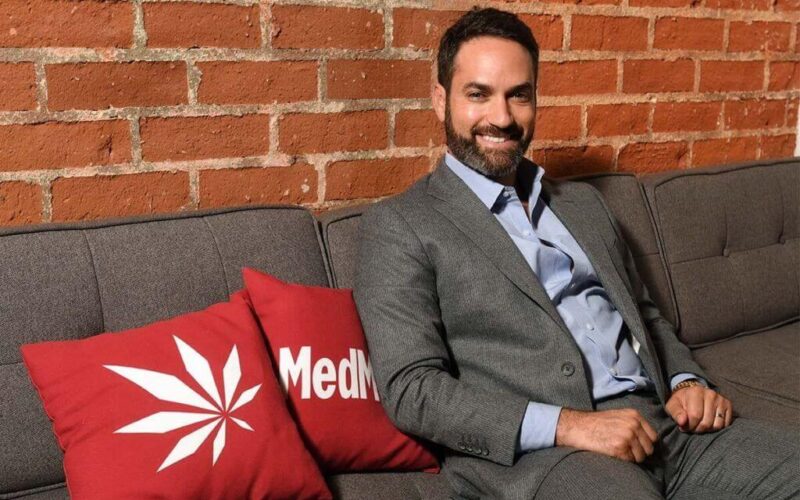[ad_1]
They’re back!
Less than a year after being ousted from leadership posts at California-based MedMen Enterprises, former CEO Adam Bierman and ex-President Andrew Modlin have found a route back into the legal marijuana industry – working for a separate cannabis company headquartered in Santa Barbara.
According to multiple industry sources, the MedMen co-founders have been working for several months with Coastal Dispensary, which holds retail, delivery, distribution and manufacturing licenses in multiple cities around Southern California and the Central Coast.
Coastal is co-owned by Colorado cannabis entrepreneur Josh Ginsberg, who co-founded Denver-based marijuana chain Native Roots. Ginsberg and Bierman reportedly have a longstanding relationship.
Bierman and Modlin’s under-the-radar return has been met with skepticism – and amazement – that the two could find a home in the industry, given their high-profile fall from grace that garnered a feature story in Politico last May.
But some industry officials note there’s a reason multistate operator MedMen had such a meteoric rise to fame and fortune, which suggests Bierman and Modlin could bring value to Coastal.
Former MedMen staffers involved
Details surrounding Bierman and Modlin’s roles with Coastal remain sketchy, in part because company executives didn’t respond to multiple Marijuana Business Daily requests for comment.
Bierman and Modlin also could not be reached for comment.
But industry sources said the two have assembled a team of former MedMen employees and brought them to work for Coastal, in part to facilitate expansion plans for their newfound corporate home.
“It’s building the retail identity. I think it’s putting together the brand and stuff like that. They’re trying to grow and scale,” said a former Coastal contractor who requested anonymity to speak freely to MJBizDaily. “(Bierman is) definitely helping them scale that out.”

Andrew Modlin
The contractor said Bierman and Modlin have been working with Coastal for at least six months.
And while Coastal’s website says the company has 12 retail locations, the contractor said only a few of those are operational.
Coastal currently holds four active retail permits, including two for storefronts in Lompoc and Santa Barbara, and two others for delivery, according to records from the California Bureau of Cannabis Control.
Another Southern California marijuana industry businessman, who requested anonymity to speak candidly, said he learned from a Coastal employee that Bierman is a longtime investor in the company and has been appointed to Coastal’s board of directors.
He described Bierman and Modlin as “strategic partners” for Coastal.
“My understanding is that Adam (Bierman) specifically has been an investor into Coastal for a long time, like over the last couple years, and has a close relationship with … Josh (Ginsberg),” the businessman said. “They have a very close relationship.”
Los Angeles-based consultant Avis Bulbulyan, the CEO of California cannabis consultancy Siva Enterprises, said he heard a few weeks ago from clients in the MJ retail space that Bierman pitched them directly on behalf of Coastal in an attempt to raise capital.
“Apparently (Bierman has) been going around to retailers and investors and pitching a retail-management concept, sort of along the lines of MedMen 2.0,” Bulbulyan said.
“From what I understand, (Bierman is) on the board of Coastal, and they’re using Coastal as a launching pad, and they’re pitching other dispensary license holders to go in under the umbrella, with a retail brand-management concept, no different from what MedMen was.”
MedMen backstory
When Bierman and Modlin got their start in the marijuana industry, they were able to expand quickly through the use of management agreements to run retail outlets owned by other cannabis entrepreneurs.
In short, the two were hired operations officers running the day-to-day business at storefronts. But they weren’t primarily license holders or dispensary owners themselves in MedMen’s early years.
That business model seems to be part of their current playbook for Coastal in some fashion: Remake marijuana retail outlets owned by others so they’re sleeker and more attractive to consumers.
Jerred Kiloh, the president of the Los Angeles-based United Cannabis Business Association (UCBA), said he’d heard months ago that Bierman and Modlin had made a return to the industry, but he only recently found out more details because Coastal applied for membership to the UCBA.
“I have personally only heard that they are trying to raise money and package their retail assets together, which is maybe more like the model they had started with, when MedMen was first coming out of L.A.,” Kiloh said.
It’s unclear whether Bierman and Modlin had any sort of noncompete agreement with MedMen when they departed the company last year.
Spokespeople at MedMen did not respond to an MJBizDaily request for comment.
Ginsberg, who is listed on the state Bureau of Cannabis Control’s database as one of five co-owners of Coastal, referred MJBizDaily to a Coastal employee who did not respond to a request for comment.
The silence surrounding the return of both Bierman and Modlin is noteworthy, given how media-friendly Bierman was while at the helm of MedMen, a company that had a spectacular rise and was once hailed as the “Apple Store of Weed.”
But after MedMen went public in 2018 with a $1.6 billion valuation, its stock price nosedived in 2019 and the company – with Bierman and Modlin at the center – laid off hundreds of employees and unloaded “noncore assets.” The company’s stock also suffered.
MedMen – as well as Bierman and Modlin – were also beset with lawsuits, immense financial losses, high turnover at the executive level and allegations of financial improprieties.
“MedMen effectively went bankrupt when its lenders took over, equitized unpayable debts and provided additional capital at enormous dilution to existing shareholders,” Mike Regan, founder and analyst at MJResearchCo, said when asked about the leadership of Bierman and Modlin at MedMen.
Regan noted that a particular red flag was when MedMen started trying to pay vendors with equity in the company, adding, “Retailers typically implode when vendors cut off supply on liquidity concerns.”
As of March 2, MedMen’s stock (MMNFF) was trading at roughly 40 cents per share on the U.S. over-the-counter markets.
MedMen still struggling
MedMen is still recovering from the missteps of Bierman and Modlin and has been trying to settle with creditors for much of the past year.
The company’s latest move was to sell off its New York operation for $63 million to Ascend Wellness in a fight for survival.
MedMen’s corporate debt load, for instance, was still roughly 3½ times the company’s annual revenues as of December.
Some of the lawsuits filed against MedMen while Bierman and Modlin were at the helm remain unresolved, including one in which former Chief Financial Officer James Parker alleged he was forced from his position amid a toxic work atmosphere created by the two.
A MedMen spokesperson called that lawsuit “baseless claims” when it was filed.
After Bierman and Modlin stepped down from their MedMen leadership posts in January 2020, both retained seats on the company board of directors until June, at which point they exited entirely.
Their professional futures in the industry were a question mark, and their return has been met with a combination of skepticism and wait-and-see.
“Everyone loves a comeback, but then there are those rare times when the market is happy to see someone fail,” said industry veteran Rob Hunt, a principal at Linnaea Holdings, a California-based private equity firm.
“I have no idea why Coastal would put their reputation on the line by associating with those who are viewed in such a controversial way.”
Hunt reckons Coastal’s bet on Bierman and Modlin could come back to bite the company.
“Anytime a business accepts capital, it has to think of the consequence of having that party attached to its business or on its cap table,” Hunt said.
“In some cases, it may be best to refuse the money if capital comes with more baggage than value. This very well could be one of those times.”
Bulbulyan agreed, saying that, although Bierman and Modlin might bring significant business acumen and value to the table, they also carry baggage.
“They really were bad for the industry,” Bulbulyan said. “They left the industry with a black eye. They really hurt a lot of investors, and a lot of people in general, from their workers to” financial backers.
Can they move past MedMen?
Bulbulyan questioned the wisdom in Coastal partnering with Bierman and Modlin and noted there could be professional conflicts with MedMen that might be unresolved for the pair.
“The MedMen fallout hasn’t really concluded yet,” Bulbulyan said. “They’re still dealing with litigation. They’re still liquidating. They’re still trying to restructure their company. They’re still trying to get investors paid back on their bad investment.
“So, when you take all that into consideration … it’s kind of like, ‘What the hell are you thinking?’”
The former Coastal contractor, however, said that Bierman and his team have brought significant value to Coastal, noting that a number of the company’s stores have been significantly remodeled since Bierman and Modlin were brought on.
“(Bierman has) a lot of experience in the industry. … He’s an operator, he’s a fundraiser, a lot of stuff. He is a valuable asset. (Coastal) saw that, they saw the opportunity, and that’s probably why they brought him in,” the contractor said.
UCBA’s Kiloh also indicated he was inclined to cut Bierman and Modlin some professional slack and that their work with Coastal isn’t likely to affect the company’s bid to become a UCBA member.
“We’re all looking to redefine ourselves in the current market,” Kiloh said. “If Adam and Andrew find a way to redefine themselves and bring value to a new company, then more power to them.
“I think we should all allow people to adjust to a new market, because it was chaos back in the day. It was the wild, Wild west.”
John Schroyer can be reached at [email protected].
[ad_2]
Source link
Medical Disclaimer:
The information provided in these blog posts is intended for general informational and educational purposes only. It is not a substitute for professional medical advice, diagnosis, or treatment. Always seek the advice of your physician or other qualified healthcare provider with any questions you may have regarding a medical condition. The use of any information provided in these blog posts is solely at your own risk. The authors and the website do not recommend or endorse any specific products, treatments, or procedures mentioned. Reliance on any information in these blog posts is solely at your own discretion.







